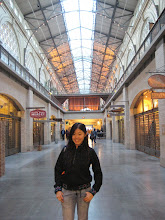
As a university student, I like frequently visiting public library for self-studying, finding reference books, accessing internet service, printing notes, enjoying leisure readings etc. Library itself has long provided us a pleasant environment to seek silence for self-improvement. In addition, it allows multifarious ideas transmitting across different users even in a less spoken communication, yet enhancing great success in effective mutual understanding. The reasons lying behind are the function and role the "language in use" performing in text or conversation.
Right after we entry the library, we can immediately notice SILIENT PLEASE these letters. Then we would keep silent in order not to disturb other readers. Next, when we sit down, we easily figure out a series of reminders such as CARE FOR YOUR BELONGINGS, NO PHONE, NO FOOD AND DRINKS, NO SEAT RESERVATION, OFF THE LIGHT WHEN NOT IN USE etc. Those technical tools including visual texts, note, eye-catching symbols help control our perspective to be a "responsible library users". Finally, even without any librarian to remind us, we would take care for our personal belongings, turn off the mobile rings and put those food and drinks in bags.
The above actions we performed are simply based on we claiming the identity of "library users" going along. The reminders, the discourses derived by those cultural tools, are more than the language beyond the level of a statement in rules. Therefore, they are actually leading us to perform different actions corresponding to the discourses.
Sometimes, as the discourses in the social context, the library, are primarily conducted in written instead of spoken form, people might see different things and interpret different meanings even though they share the same language pattern. For example, when we read every lines of instructions about ACCESSING FREE GOV WI-FI INTERNET , due to individual comprehensive capability or complicated word meanings, people might still finally be unable to access to the internet.

No comments:
Post a Comment